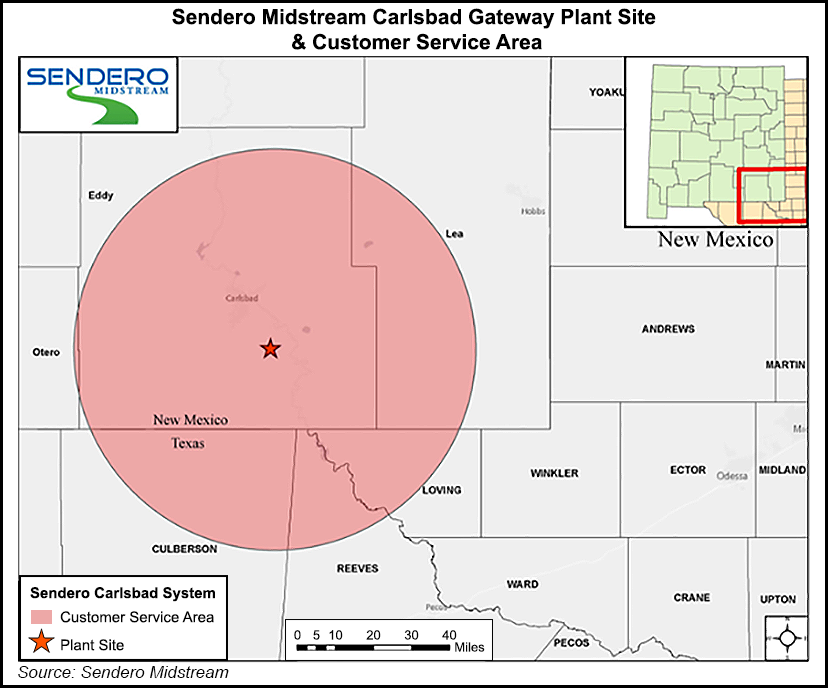Regulatory | Infrastructure | NGI All News Access
FERC OKs Sendero’s Permian Carlsbad Gateway Pipeline; Glick Dissents
FERC has issued a certificate to Sendero Carlsbad Gateway LLC’s 400 MMcf/d natural gas pipeline to transport Permian Basin supply across the New Mexico/Texas border.

The Federal Energy Regulatory Commission, currently with only three sitting commissioners, issued the decision late last week in a split vote, with Democratic Commissioner Richard Glick dissenting.
Sendero, a subsidiary of Sendero Midstream Holdings, filed with FERC last year seeking approval to construct and operate the 23-mile, 24-inch diameter pipeline. The Carlsbad Gateway project is designed to transport residue gas from processing plants in Eddy County, NM, to an interconnect with White Water Midstream LLC’s Agua Blanca intrastate system in Culberson County, TX.
In August, Sendero had urged the Commission to act quickly to approve the project, stating that the prolonged regulatory timeline was contributing to additional flaring of associated gas in the Permian to the detriment of both producers and the environment. The company told FERC at the time that its affiliate had already completed a $100 million processing plant designed to work in tandem with the Carlsbad Gateway line.
FERC issued an Environmental Assessment for the project in January, finding that with proper mitigation it “would not constitute a major federal action significantly affecting the quality of the human environment.”
In his dissent, Glick, as he has in previous certificate decisions, argued that FERC failed to adequately consider climate change impacts, specifically greenhouse gas emissions (GHG) from fossil fuels, in its review process for the Carlsbad Gateway project.
Neither the Natural Gas Act nor the National Environmental Policy Act “permit the Commission to assume away the climate change implications of constructing and operating this project,” Glick said. “Yet that is precisely what the Commission is doing here.”
By sidestepping an analysis of the potential GHG emissions from the project and their contribution to climate change, FERC has fallen short of the “reasoned decision-making” required in a public interest determination, he said.
“The Commission uses the purported inability to evaluate the significance of the impact from climate change as a basis to wholly exclude that impact from its public interest determination,” Glick said. “Based on its alleged inability to assess the significance of the project’s impact on climate change, the Commission concludes that the project will have no significant environmental impact.
“Think about that. The Commission is saying out of one side of its mouth that it cannot assess the significance of the project’s impact on climate change while, out of the other side of its mouth, assuring us that all environmental impacts are not significant. That is ludicrous, unreasoned and an abdication of our responsibility to give climate change the ”hard look’ that the law demands.”
Prior to the departure of long-time Democratic Commissioner Cheryl LaFleur in August, FERC had been split evenly along party lines over the Commission’s approach to considering the climate change impacts of natural gas infrastructure, among other issues. These partisan tensions appeared to stall certificate decisions on certain projects.
Sendero is not the only Lower 48 pipeline developer to encounter delays resulting from FERC inaction over the past year.
This summer, Dominion Energy Transmission Inc. canceled its Sweden Valley Project, telling FERC that it lost a customer after waiting months past its requested deadline for receiving a certificate of public convenience and necessity.
Blaming a prolonged review at FERC, Tallgrass Energy LP said it had to push back the start-up date for its 600,000 Dth/d Cheyenne Connector pipeline to early 2020. FERC issued a certificate for that project last month.
© 2024 Natural Gas Intelligence. All rights reserved.
ISSN © 1532-1231 | ISSN © 2577-9877 |
